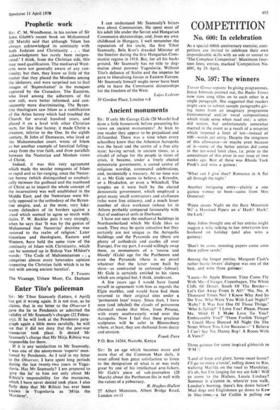Ancient monuments
Sir : If only Mr George Gale (28 March) had done a little homework before presenting his views on ancient monuments! At least to one reader they appear to be prejudiced and ill-founded. There was a time when every schoolboy knew that the Athenian Acropolis was the heart and the centre of a free city state; having served, in ancient times, as a citadel of refuge for the people in times of crisis, it became, under a freely elected democratic government, a sacred centre of religious worship, communal celebrations, and, incidentally a treasury. At no time was it, as Mr Gale seems to believe, a Kremlin, — or a Hradschin, or even a VVhitehall. The temples on it were built by the elected democratic government, which employed a great many small contractors and craftsmen (who were free citizens), and a much lesser number of slave workmen (whose lot in Athens probably compared favourably with that of mediaeval serfs in Durham).
I have not seen the mediaeval buildings in Northumberland which Mr Gale likes so much. They may, be quite attractive but they certainly are not unique as the Acropolis buildings and the Pyramids are (there are plenty of cathedrals and castles all over Europe). For my part, I would willingly swap them, as monuments of a 'coarse and bloody' (Gale) age for the Parthenon and even the Pyramids (there is no proof whatever that the latter were built by slave—as contrasted to enforced—labour). Mr Gale is certainly entitled to his views which are original but, I think, irrelevant A few years ago I would have found myself in agreement with him as regards the Elgin marbles, and would have had them returned to their original sites under a 'permanent loan' treaty. Since then, I have seen (and inhaled) the clouds of poisonous chemical smoke that blow, from Piraeus, with every southwesterly wind over the Acropolis. Now I feel that these precious sculptures will be safer in Bloomsbury where, at least, they are sheltered from decay and erosion.
Frank Piers P.O. Box 14264, Nairobi, Kenya Sir: In an age which becomes more and more that of the Common Man daily, it must afford him great satisfaction to listen to the denigration of what is or was truly great by one of his intellectual arse-lickers. Mr Gale's piece of sub-journalese (2.8 March) about the Parthenon fits in well with the values of a yobocracy.
R. Hughes-Hallett 27 Albert Mansions, Albert Bridge Road, London swIl






































 Previous page
Previous page